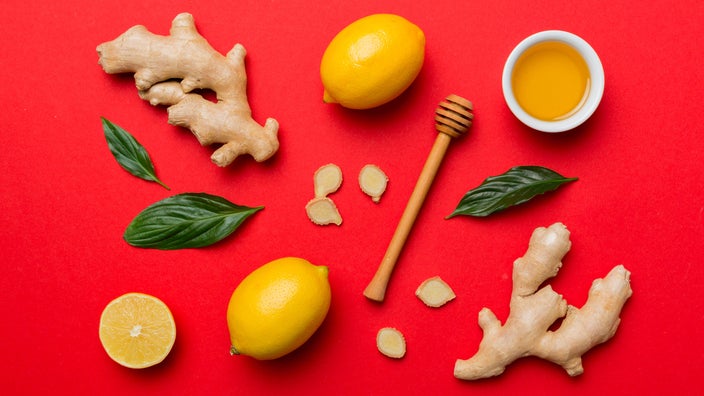
15 Foods to Eat When You Have a Cold, Plus What You Should Avoid
Key takeaways:
Your dietary choices matter when you have a cold. There are certain foods you can eat to help your symptoms, but there also are foods you should avoid when you have a cold.
Immune-boosting foods rich in vitamins and antioxidants may help to improve your cold symptoms. These include foods like citrus fruits, berries, and leafy greens.
Proper hydration plays a critical role in thinning mucus and soothing a sore throat. Drinking plenty of fluids can help relieve cold symptoms.
Table of contents

When you’re feeling under the weather because of a cold, your dietary choices can help to improve symptoms and boost your immune system. Choosing nutrient-rich foods can help you recover and get back on your feet in no time. On the other hand, eating certain foods like sugary snacks and processed foods when you have a cold may actually worsen symptoms and slow down your body’s natural healing.
Eating a nutritious and balanced diet when you have a cold supplies your body with the energy it needs to ward off those pesky symptoms. Let’s take a closer look at the best foods to eat for a cold, and those you should be avoiding until you’re feeling better.
1. Ginger
This herbal remedy contains several compounds that give it its anti-inflammatory and soothing qualities. Ginger is widely thought to be one of the healthiest spices due to its benefits. It may not only help to reduce cold symptoms, but it can also help to aid digestion and calm nausea.
Search and compare options
2. Hot tea
A cup of hot tea can provide much-needed relief from the discomfort of a cold. Herbal teas can soothe a sore throat and help alleviate congestion. Adding honey and lemon not only enhances the taste but also provides comfort.
Hot teas you may want to try to help improve your cold symptoms include:
Chamomile
Peppermint
Green tea
3. Garlic
Garlic is often thought of as a superfood. Garlic can help with colds due to its potential antiviral properties. This is likely due to the allicin it contains. Adding garlic into soups, stews, and sautéed vegetables is a wise choice when nursing a cold.
4. Oatmeal
While oatmeal might not be the first thing that comes to mind when thinking of cold remedies, this breakfast staple may actually be helpful. It’s rich in beta-glucan, which stimulates the immune system. And it’s packed with zinc and selenium, both of which help against infections. A serving of oatmeal when you have a cold may help you feel better faster.
5. Chicken soup
A bowl of chicken soup can help with a cold because it provides spoonfuls of hydration and essential nutrients. Cysteine, an amino acid found in chicken, helps break up mucus secretions. The soup broth also helps to increase mucus flow, helping your body fight the cold virus.
6. Citrus fruit
The effectiveness of vitamin C in citrus fruits for preventing or improving cold symptoms remains a subject of debate. But there may be some immune system benefits if you consume foods rich in vitamin C regularly. This could make them a welcome choice when you have a cold.
Some citrus fruits you may want to add to your diet when you have a cold can include:
Oranges
Lemons
Limes
Grapefruits
Need quick cold relief? Here are some tips to feel better faster from that pesky cold.
Should you “feed a cold and starve a fever”? Experts share what home remedies can help you get over cold symptoms.
Starting to feel a little under the weather? Find out what you can do to try and stop a cold in its tracks when you feel it coming on.
7. Bananas
Bananas (famously part of the BRAT diet) are good for colds because of their gentle effect on the stomach. Because of their soft texture, bananas are an excellent choice for soothing a sore throat or easing an upset stomach. Additionally, they help replace potassium levels to keep your electrolytes balanced.
8. Leafy greens
Leafy greens like spinach and kale are excellent sources of vitamins, fiber, and minerals. They are also rich in quercetin, a powerful antioxidant to give you a boost when fighting a cold.
If the thought of eating a bowl of leafy greens doesn’t sound tasty to you while you’re having a cold, try putting them into smoothies or soups. You’ll still be able to reap their nutritional benefits that way.
9. Yogurt
Probiotics found in yogurt play a crucial role in supporting gut health and enhancing immune function. Plain yogurt with live and active cultures is a good choice. Despite common belief, there isn’t hard evidence that dairy will cause an increase in mucus production. Feel free to enjoy some yogurt if it doesn’t seem to bother you.
10. Spicy foods
While they won’t cure a cold, spicy foods like chili peppers can be helpful in improving cold symptoms. Spicy foods may help with clearing nasal passages and congestion by thinning mucus. Additionally, capsaicin — the spicy component in peppers — may offer relief from coughing. Maybe you can try adding a little heat to your tea, soup, or broth to test its benefits.
11. Sweet potatoes
Vitamin A is an essential element for a robust immune system, and sweet potatoes are full of it. Eating them baked or mashed (minus the butter and sugar, of course) may give you a boost on your road to recovery from a cold.
12. Bell peppers
Adding bell peppers to your diet can be a part of a holistic approach to managing cold symptoms. They contain phytochemicals and antioxidants like beta-carotene, which have anti-inflammatory effects. The high water content in bell peppers can also help thin mucus and soothe a sore throat, making you more comfortable while you recover.
13. Avocado
Packed with vitamins B6, C, and E, avocados can help keep your immune system strong. Avocados also have healthy fats, like omega-3 fatty acids, that can reduce inflammation. If you don’t feel like eating much when you’re sick, avocados are soft and gentle on the stomach, making them easy to eat even when you have a cold.
14. Cherries
Tart cherries are natural sources of melatonin, which can improve sleep quality — a key part of recovering from a cold. They also contain anthocyanins, which have anti-inflammatory effects that can help reduce symptoms like body aches and a sore throat.
15. Turmeric
Turmeric has a special ingredient called curcumin, which can help your body fight off a cold. It works because it helps reduce swelling and protects your body with its powerful antioxidants.
You can make turmeric tea by boiling water and adding fresh turmeric or turmeric powder. Stir in a little ginger and squeeze some lemon for extra flavor. This tea can help soothe a sore throat and boost your immune system. You can also mix turmeric into soups, broths, or smoothies to help you feel better faster.
What foods to avoid when you have a cold
It’s equally important to know which foods to steer clear of when you have a cold. Some foods you may want to avoid if you have a cold include:
Sugary foods and drinks: Excess sugar can increase inflammation and may worsen cold symptoms.
Fried and greasy foods: These can be difficult to digest and may worsen an upset stomach.
Alcohol: It can cause dehydration, making it harder to fight off a cold virus.
Excessive caffeine: Too much caffeine can disrupt your sleep, which is essential for recovery.
Hard or crunchy foods: Foods like chips, crackers, or hard granola can be abrasive and may irritate a sore throat.
Processed foods: Fast food has lots of salt and unhealthy, saturated fats that can compromise your immune system over time. Opt for whole, nourishing foods instead.
Frequently asked questions
Several nutrients protect your body from getting sick by making your immune system stronger. Some of these include vitamins A, C, D, and E. Additionally, zinc can also give your immune system a boost and help you recover faster.
Vitamin C can’t keep you from catching a cold, but it might help you get over it quicker. Some studies suggest that taking vitamin C regularly might shorten the length of a cold by about a day and lessen the severity of symptoms. However, it’s not a cure-all, and maintaining a balanced diet with other essential nutrients is also important for overall immune health.
The bottom line
When you have a cold, your food choices can affect your comfort and recovery. Options, like ginger, hot tea, leafy greens, and citrus fruits may help to boost your immune system and reduce symptoms. There are also some foods that may make your cold symptoms worse, like alcohol and fast food. Make sure you’re nourishing your body well to fight a cold — it just may make your recovery smoother and faster.
Why trust our experts?


References
Ankri, S., et al. (1999). Antimicrobial properties of allicin from garlic. Microbes and Infection.
Auinger, A., et al. (2013). Yeast (1,3)-(1,6)-beta-glucan helps to maintain the body's defence against pathogens: A double-blind, randomized, placebo-controlled, multicentric study in healthy subjects. European Journal of Nutrition.
Banerjee, S., et al. (2019). Acetylcysteine for patients requiring mucous secretion clearance: A review of clinical effectiveness and safety. Canadian Agency for Drugs and Technologies in Health.
Bode, A. M., et al. (2011). Chapter 7: The amazing and mighty ginger. Herbal Medicine: Biomolecular and Clinical Aspects, 2nd edition.
Calder, C. P. (2021). Foods to deliver immune-supporting nutrients. Current Opinion in Food Science.
Chen, O., et al. (2021). The role of oat nutrients in the immune system: A narrative review. Nutrients.
Chew, B. P. (1993). Role of carotenoids in the immune response. Journal of Dairy Science.
Dreher, M. L., et al. (2013). Hass avocado composition and potential health effects. Critical Reviews in Food Science and Nutrition.
Ganesan, S., et al. (2012). Quercetin inhibits rhinovirus replication in vitro and in vivo. Antiviral Research.
Howatson, G., et al. (2012). Effect of tart cherry juice (Prunus cerasus) on melatonin levels and enhanced sleep quality. European Journal of Nutrition.
Huang, Z., et al. (2018). Role of vitamin A in the immune system. Journal of Clinical Medicine.
Institute for Quality and Efficiency in Health Care (IQWiG). (2023). Common colds: Research summaries – does vitamin C prevent colds? InformedHealth.org.
Kuwabara, Y., et al. (2024). Effects of highly bioavailable curcumin supplementation on common cold symptoms and immune and inflammatory functions in healthy Japanese subjects: A randomized controlled study. Journal of Dietary Supplements.
Lissiman, E., et al. (2014). Garlic for the common cold. The Cochrane Database of Systematic Reviews.
Liu, J., et al. (2021). Anthocyanins: Promising natural products with diverse pharmacological activities. Molecules.
Ma, X., et al. (2022). Excessive intake of sugar: An accomplice of inflammation. Frontiers in Immunology.
Myles, I. A. (2014). Fast food fever: Reviewing the impacts of the Western diet on immunity. Nutrition Journal.
O’Callaghan, F., et al. (2018). Effects of caffeine on sleep quality and daytime functioning. Risk Management and Healthcare Policy.
Pinnock, C. B., et al. (1990). Relationship between milk intake and mucus production in adult volunteers challenged with rhinovirus-2. The American Review of Respiratory Disease.
Rennard, B. O., et al. (2000). Chicken soup inhibits neutrophil chemotaxis in vitro. Chest.
Sanu, A., et al. (2008). The effects of a hot drink on nasal airflow and symptoms of common cold and flu. Rhinology.
Shahbazi, R., et al. (2020). Probiotics in treatment of viral respiratory infections and neuroinflammatory disorders. Molecules.
Ternesten-Hasséus, E., et al. (2015). Cough reduction using capsaicin. Respiratory Medicine.

























